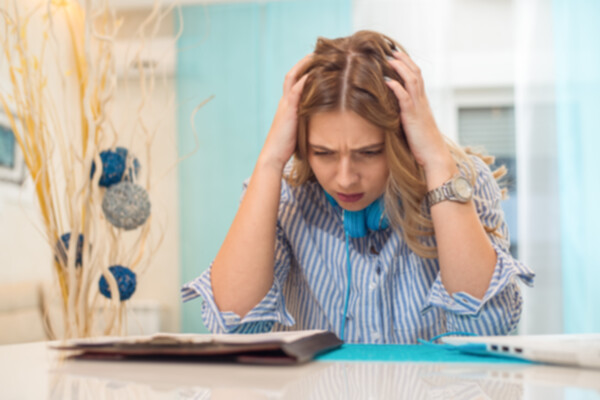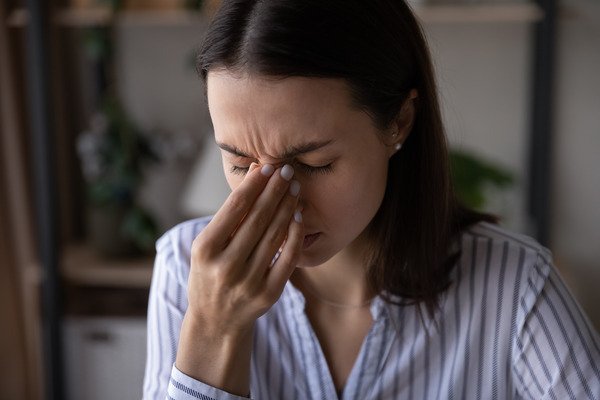What are the effects of anxiety at work? What causes work anxiety? Discover the main symptoms of work anxiety and how to deal with this situation.
Many people can experience the effects of anxiety due to their work. The work anxiety refers to excess stress due to work that leads to suffering from an anxiety disorder. When people are in a situation of anxiety about work, they often experience problems concentrating, excessive fatigue, irritability and lower productivity, which often leads to them having to repeat a task again or correct errors, which leads to more stress and even extreme anxiety.
What is work anxiety?
Long working hours, as well as high demands and the lack of clear objectives may be some of the reasons why people may suffer from anxiety at work More specifically, jobs with high demands (high workload, time pressure, and role conflict), low control (low autonomy and authority), and rewards (money, esteem, career opportunities) can increase stress. and, therefore, the risk of mental disorders such as work anxiety.
Signs of work anxiety
Although there is not specifically a work anxiety disorder , there are some signs or symptoms that are typical of anxiety disorders. Some of the most common when experienced at work are the following:
- Excessive worry: One of the work anxiety symptoms It is having too much worry around work.
- Sleeping problems: The worries or anxiety are so much that people can suffer from insomnia because of it.
- Shocks and scares: The anxiety at work It can also cause people to startle exaggeratedly in different situations.
- Constant nervousness: feel too much overwhelm at work It can also cause being nervous and tense not only in a professional environment but also at home or in environments not related to the profession.
- Tiredness or fatigue : One of the effects of anxiety What is constantly experienced is precisely the feeling of tiredness or fatigue. People can wake up, even if they are sleeping well, with the feeling of never having had enough rest.
- Feeling of a lump in the throat: The extreme anxiety It can also end up causing some effects due to constant muscular and physical tension. One of the most common is the feeling of having a lump in your throat that can even prevent you from swallowing or being comfortable.
- Overreactions: People who suffer from all effects of anxiety They tend to have overly exaggerated reactions even though the circumstances do not give rise to it.
- Focus on the negative aspects of the job : When you experience too much anxiety at work Many people may have a very negative attitude about their profession or everything that the job entails.
- Lack of concentration: By experiencing work anxiety People can end up having a lot of difficulty completing or concentrating on certain tasks.
These are the work anxiety symptoms more common. If you feel identified with any of them and are having difficulties coping with this situation, it is crucial that you consult with a professional psychologist.

Causes of work anxiety
Suffer from anxiety about work It could be for a wide variety of reasons. Still, there are some specific reasons that can contribute to overwhelm at work becoming overwhelming:
- Workplace Harassment: Conflicts or so-called workplace mobbing can be one of the reasons why people end up suffering from work anxiety
- Working long hours: People who work too many hours can end up suffering from a extreme anxiety due to lack of rest.
- Having an overly demanding boss: Too many demands, in a very limited time, can also cause people to end up developing a work anxiety disorder
In addition to these causes, people may experience the work anxiety symptoms because they do not feel comfortable in their work environment.
Effects of work anxiety
If a person ends up living with work anxiety, it is a matter of time before this disorder ends up affecting other aspects of their life. Mainly, the consequences of anxiety about work They can affect the following aspects:
- Poor work performance and less productivity
- Seeing relationships with co-workers and superiors affected
- Effects on personal life (in relationships with partners, friends and family)
- Develop concentration problems, fatigue and irritability
- Rejecting opportunities due to phobias (fear of speaking in public or fear of being judged by others).
- Low job satisfaction
- Feeling little confidence in your abilities
- Take fewer risks and feel like you have stagnated professionally

How to manage anxiety at work?
There are some strategies you can use to control anxiety at work In addition to going to a professional psychologist, you can follow the following advice:
- Don’t repress your anxiety: Repressing your emotions and feelings is counterproductive. In this way, instead of trying to distance work anxiety try to accept it.
- Take care of yourself: Practicing a healthy lifestyle will allow you to prevent anxiety at work To do this, try to have a good diet, rest properly and exercise regularly. Having healthy habits will allow you to improve your resilience and you will be able to better manage anxiety and work stress.
- Question your internal dialogue: When we are immersed in negativity we tend to think more pessimistically than what is really happening. Therefore, it is important to reason with your thoughts and question whether they are really useful in making you feel better about yourself.
- Take a break : If you feel that the anxiety at work is consuming you at a specific moment, we recommend that you try to take even a small break to deal with these sensations and emotions. Go for a walk in a nearby park or sunbathe for a few minutes, this will help you clear your mind and relieve work anxiety.
- Practice progressive muscle relaxation: This technique will allow you to relax your body and calm your mind. To do it you must focus on a part of the body, tense it and then relax it as much as possible.
- Leave the coffee: Caffeine is not a good way to combat anxiety at work Therefore, it will be a good idea to keep coffee consumption to a minimum, as doing so will increase your heart rate as well as the physiological symptoms of anxiety.
- Stay connected: People who experience extreme anxiety They often end up limiting their relationship with many of their friends or family because of this. Instead of isolating yourself, it is recommended that you maintain these connections and try to talk about your problems with the people closest to you.
- Seek professional help: If you think you can’t deal with work anxiety and this is affecting you in your personal life, it is important that you go to a mental health professional.
Can you request a leave due to anxiety?
In cases where this overwhelm at work has triggered an anxiety disorder, you can request leave due to anxiety. This type of sick leave is usually requested when people express the following:
- I can’t work because of anxiety
- I want to leave work due to anxiety
- I feel too overwhelmed at work
A sick leave due to anxiety It should always be prescribed by a professional psychologist. Work is a place where we must spend a large part of our lives. For this reason, it is vital to take care of our work environment and how we feel professionally.









